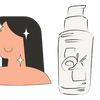
Snail Mucin for Skin
The research shows that snail mucin's bioactive components and pharmacologic activities contribute to multiple skin health applications, including skin rejuvenation, photoprotection, and wound healing.
View More in Research HubResearch Interpretation
Snail mucin has gained prominence as a bioactive ingredient in Korean cosmeceuticals and has become increasingly popular in global skincare regimens. This animal-derived ingredient is part of the innovative Korean skincare trend that has captured international attention in the beauty industry. Scientific research has begun to validate the potential dermatological benefits of this unique ingredient.
Protocols Studied in Research
[1] Bioactive ingredients in Korean cosmeceuticals: Trends and research evidence. (Cited by: 0) (PMID: 32100931)
- Protocol: A comprehensive review of biomedical literature conducted using PubMed to identify laboratory, animal, and clinical studies evaluating the biological properties and potential dermatologic uses of ingredients found in Korean cosmeceuticals, including snail mucin.
- Outcome: Snail mucin demonstrated bioactive components and pharmacologic activities that provide dermatologic benefits with potential applications for skin rejuvenation, photoprotection, and wound healing.
Research Interpretation: Summary and Conclusion
The available evidence suggests significant positive outcomes for snail mucin in dermatological applications, though this is based on a comprehensive review rather than individual clinical trials. The review (PMID 32100931) indicates that snail mucin, as an animal-derived bioactive ingredient, has undergone scientific validation and demonstrates meaningful dermatological benefits.
The research shows that snail mucin's bioactive components and pharmacologic activities contribute to multiple skin health applications, including skin rejuvenation, photoprotection, and wound healing. As part of the Korean cosmeceutical innovation, snail mucin represents a scientifically-backed ingredient that has gained global recognition for its therapeutic potential.
The evidence indicates that snail mucin is increasingly being validated through laboratory, animal, and clinical studies, suggesting its effectiveness extends beyond traditional use into evidence-based skincare applications. The ingredient's inclusion in the broader context of Korean cosmeceuticals that are "increasingly undergoing scientific validation" supports its credibility as a beneficial skincare component.
However, the authors note that further research studies are warranted to fully elucidate the biological and therapeutic mechanisms of action of snail mucin and other Korean cosmeceutical ingredients. This suggests that while current evidence is promising, additional rigorous clinical research would strengthen the evidence base for snail mucin's specific dermatological applications.
The growing public awareness and interest in Korean cosmeceuticals, including snail mucin, indicates consumer confidence in these ingredients, though patients are encouraged to seek dermatologist guidance for incorporating these bioactive ingredients into their skincare regimens for optimal skin health and aesthetic outcomes.
Publications
[1] Nguyen JK; Masub N; Jagdeo J (2020). Bioactive ingredients in Korean cosmeceuticals: Trends and research evidence J Cosmet Dermatol 19 (7) :1555-1569. (PMID: 32100931)

